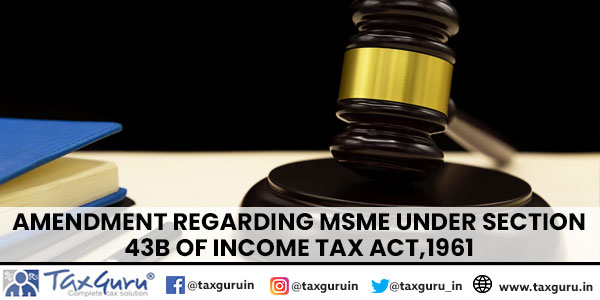Introduction: The Micro-Small and Medium Enterprise Development (MSMED) Act, 2006, serves as a cornerstone for the protection and growth of MSME units in India, contributing significantly to the economy and employment generation. Coupled with amendments in Section 43B of the Income Tax Act, 1961, effective from April 1, 2023, these legislations ensure that MSMEs receive timely payments for their goods and services while offering tax incentives to buyers for adherence to payment timelines. This synthesis of regulations highlights the government’s commitment to fostering a supportive ecosystem for MSMEs by streamlining payment processes and enforcing financial discipline among businesses engaging with these units.
1. MSME units make a major contribution towards the economy and for generation of employment in our country. The legislature brought into the statute Micro-Small and Medium Enterprise Development Act, 2006 for protection and growth of a MSME units. Some of the relevant provisions of the act are as under:
1.1 The payment to MSME units has to be made within a certain timeframe which has been provided as 15 days from acceptance of goods or services in accordance with Section 15 of the MSMED Act, 2006.
1.2 The aforesaid period of 15 days can be extended to a maximum of 45 days by a written contract between MSME unit and the buyer.
1.3 Interest is payable to the MSME unit in case of delay in payment beyond the aforesaid time limits.
2. Section 43B of the Income Tax Act, 1961 has been amended with effect from 1stApril, 2023 wherein provision has been introduced to allow an expense incurred towards a micro or small unit in the year of payment in case the same has not been paid within the timeframe provided under Section 15 of the MSMED Act, 2006. The brief implication of the aforesaid provision are as under:
2.1 Expenses incurred towards micro or small unit during the financial year 2023–24 will be allowed while computing the taxable income for the said year in case the payment is made to them within the period specified under Section 15 of MSMED Act, 2006 or by the end of the financial year i.e. by 31st March, 2024.
2.2 Presuming a credit period of 15 days, purchases made between the period 1st April, 2023 to 17th March, 2024 will be allowed as a deduction only in case payment is made to small or micro enterprise before 31st March, 2024.
2.3 For purchases made during the period 18th March, 2024 to 31st March, 2024 the payment has to be made within the credit terms of 15/45 days of acceptance of goods or services as the case may be.
In the event of delay in payment beyond the aforesaid time limits the expenses will not be allowed for computing taxable income for the financial year 2023–24 and the same will be allowed as a deduction only in the year in which the payment is made to the such micro or small unit which has supplied goods or services as the case may be.

3. Aforesaid Section 43B(h) of the Income Tax Act, 1961 as well as the relevant provisions of MSMED Act, 2006 are briefly summarized hereunder:
3.1 There should be a written agreement in case the credit terms of supply of goods and services by the small or micro unit is more than 15 days, in any case the same cannot exceed 45 days.
3.2 The aforesaid provision in the Income Tax Act, 1961 is applicable only to micro and small units which are engaged in the manufacturing of goods or which are rendering services. In our opinion, the provision is not applicable to trading units.
3.3 Provisions of clause (h) of Section 43B of the Income Tax Act, 1961 are applicable only to micro and small enterprises and are not applicable to medium enterprises.
3.4 The said provisions would also not apply to a buyer who is covered by the provisions of Section 44AD or Section 44ADA of the Income Tax Act, 1961.
3.5 The provisions of Section 43B(h) will apply even to unit not registered under MSMED Act, 2006.
3.6 Interest payable to an MSME unit in accordance with Section 23 of the MSMED Act, 2006 will not be allowed as a deduction for computing the taxable income of the recipient of goods and services.
MSMED Act, 2006 also has a disclosure requirement which are briefly given hereunder:
4. Section 22 of MSMED Act, 2006 provides where the buyer is subject to audit under any law, he needs to furnish the additional informational along with the financials namely principal amount and interest due thereon/ delay payments/ interest due unpaid.
5. MSMED Act, 2006 also defines a micro and small unit as under:
Section 7 of the MSMED Act, 2006 defines:
1. An enterprise as micro unit where:
a) The enterprise engaged in the manufacture or production of goods, the investment in such plant and machinery (excluding Land and Building) does not exceed Rs. 1 Crore and turnover does not exceed Rs. 5 Crores.
b) The enterprise engaged in providing or rendering of services, the investment in equipment does not exceed Rs. 10 lacs.
2. An enterprise as a small enterprise where:
a) The enterprise engaged in the manufacture or production of goods, the investment in such plant and machinery (excluding Land and building) does not exceed Rs. 10 Crore and turnover does not exceed Rs. 50 Crores.
b) The enterprise engaged in providing or rendering of services, the investment in equipment is more than Rs. 10 lacs but does not exceed Rs. 2 Crores.
Conclusion: The legislative framework comprising the MSMED Act, 2006, and the relevant amendments to the Income Tax Act, 1961, underscores the government’s strategic approach to bolster the MSME sector. By mandating prompt payment practices and aligning tax benefits with compliance, these regulations not only safeguard the interests of MSMEs but also incentivize buyers to adhere to ethical business conduct. As MSME units continue to be the backbone of the Indian economy, such provisions are pivotal in ensuring their sustained growth and contribution to the national economic fabric. Businesses must stay informed and compliant with these legal requirements to foster mutually beneficial relationships with MSME partners and contribute to the broader economic development.





